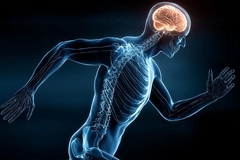Spotlight on postbiotics and nutrients to manage sleep, stress and menopause symptoms

From better sleep and reduced stress to stronger bones and fewer hot flashes, science-backed postbiotics and nutrients like Lactobacillus gasseri CP2305, Quatrefolic folate, and vitamin K2 are emerging to support women’s health through menopause. Nutrition Insight speaks to ADM and Gnosis by Lesaffre to unpack the evidence and science behind these key ingredients.
Innova Market Insights data indicates that 37% of female consumers globally take vitamin/mineral supplements to reduce the symptoms of menopause. This interest has sparked market growth, and supplements with menopause claims grew 14% from April 2020 to March 2025. Sixty-two percent of these launches were in Europe.
During that period, the market researcher’s data suggests that the top claims for menopause supplements are women’s health (88%), brain-mood health (51%), energy and stamina (47%), bone health (30%), and skin health (30%).
We previously spoke with ADM and Gnosis by Lesaffre, along with Novonesis, about the evolving menopause nutrition market, with a strong focus on heart and bone health, mood, and cognitive support.
Postbiotic for sleep
June Lin, VP of Global Innovation Marketing at ADM, spotlights the newest gut microbiome-supporting solution in the company’s portfolio, L. gasseri CP2305 postbiotic, which has shown support for aspects of women’s health.
 L. gasseri CP2305 postbiotic may improve sleep quality, reduce stress, and boost emotional well-being in menopausal women.“Results from a 2022 study found L. gasseri CP2305 postbiotic may support positive changes in physiological and emotional parameters in women experiencing menopause. Clinical trials also find L. gasseri CP2305 may be associated with emotional well-being, reduced stress, better sleep efficiency, reduced sleep latency, healthy overall sleep quality, and improved total sleep duration.”
L. gasseri CP2305 postbiotic may improve sleep quality, reduce stress, and boost emotional well-being in menopausal women.“Results from a 2022 study found L. gasseri CP2305 postbiotic may support positive changes in physiological and emotional parameters in women experiencing menopause. Clinical trials also find L. gasseri CP2305 may be associated with emotional well-being, reduced stress, better sleep efficiency, reduced sleep latency, healthy overall sleep quality, and improved total sleep duration.”
These benefits are especially helpful for women going through menopause, as they often face emotional swings and sleep issues, adds Lin. “Clinical evidence behind resilient solutions like L. gasseri CP2305 is a game-changer for tailored women’s health offerings.”
“Since postbiotics can retain functionality through challenging formulation environments, they represent the next generation of functional offerings, aligning with women’s unique wellness goals and lifestyles.”
“Convenient, enjoyable, functional formats like snack packs, gummies, and chocolate bites encourage consumption during stressful life moments, ultimately aiding adherence and supporting menopausal-related symptoms,” she notes.
Microbiome support
Lin suggests microbiome-supporting solutions that could complement L. gasseri CP2305 include ADM’s BPL1 (Bifidobacterium animalis subsp. lactis CECT8145) probiotic and postbiotic, and the DE111 (Bacillus subtilis) spore-forming probiotic.
“These solutions may support weight management goals. BPL1 targets aspects related to metabolic health, with emerging and in vitro evidence suggesting that, in combination with diet and exercise, BPL1 postbiotic may help support visceral fat reduction, promote a healthy waist circumference, and improve metabolic health pathways.”
Meanwhile, DE111’s effects were tested during the offseason training of female collegiate athletes, showing a reduction in body fat percentage.
“Furthermore, certain prebiotic dietary fibers may help stimulate appetite-regulating hormones and increase fullness perception,” says Lin. “ADM/Matsutani LLC’s Fibersol, a prebiotic dietary fiber, has a study demonstrating that consumption of 10 g of Fibersol with a meal may increase the appetite-regulating hormone GLP-1 as part of a normal physiological response in healthy individuals.”
“For hot flashes, we rely on our science-backed Novasoy soy isoflavones, for which there is clinically documented evidence demonstrating it may reduce the number and frequency of hot flashes. Novasoy may also help maintain healthy bones following the transition into menopause.”
 Quatrefolic folate helps lower homocysteine, supporting heart, bone, mood, and cognitive health.Lin notes that soy isoflavones, such as Novasoy, have also been demonstrated to support women in maintaining mental acuity and fogginess, which are concerns among women who are approaching or going through menopause. According to research, Novasoy may promote mental flexibility and memory.
Quatrefolic folate helps lower homocysteine, supporting heart, bone, mood, and cognitive health.Lin notes that soy isoflavones, such as Novasoy, have also been demonstrated to support women in maintaining mental acuity and fogginess, which are concerns among women who are approaching or going through menopause. According to research, Novasoy may promote mental flexibility and memory.
Strong evidence behind Quatrefolic
Silvia Pisoni, the global operational marketing director at Gnosis by Lesaffre, shares that the company’s main nutritional ingredients for menopause include Quatrefolic 5-methylfolate (5-MTHF), MenaQ7 Vitamin K2, and Adonat Premium SAMe (S-adenosylmethionine).
“Quatrefolic — the biologically active form of folate — has been shown to support both bone health and cardiovascular function in menopausal women by normalizing homocysteine levels in plasma.”
“Insufficient folate in the body contributes to high amounts of circulating homocysteine. Excessive homocysteine is implicated in a wide range of adverse health conditions, including cardiovascular diseases and compromised bone health,” she warns.
Pisoni notes that a 2015 meta-analysis revealed that high homocysteine levels predict cardiovascular risk factors in older women (and men) and the general population. A recent cross-sectional study found a strong positive link between dietary folate intake and bone mineral density.
“Clinical studies strongly suggest that folate supplementation can reduce cardiovascular risks by lowering homocysteine levels. Supplemental 5-MTHF helps convert homocysteine to methionine.”
“One study compared the efficacy of Quatrefolic (400 mcg plus B6 and B12) versus conventional vitamin supplementation with highly dosed folic acid (5 mg/day) in lowering homocysteine serum levels in hypertensive subjects. The results showed a significant homocysteine reduction in subjects who supplemented with the Quatrefolic product.”
She adds that 55.8% of the participants in the Quatrefolic group reached ideal homocysteine levels, which was significantly higher than in the folic acid supplement group.
“Elevated homocysteine levels are also associated with cognitive and mood impairment, conditions that tend to plague healthy menopausal women. Studies have demonstrated a relationship between folate intake, improved mood, and protection against cognitive impairment.”
Vitamin K2 for healthier bones
Pisoni asserts that vitamin K2 is a crucial factor for postmenopausal and menopausal women who wish to maintain their physical and mental vigor as they age.
 Vitamin K2 (MenaQ7) strengthens bones while protecting arteries from calcium buildup.K2 promotes appropriate calcium utilization by activating vitamin K-dependent proteins — osteocalcin and Matrix Gla Protein (MGP) — protecting bone and heart health at the same time.
Vitamin K2 (MenaQ7) strengthens bones while protecting arteries from calcium buildup.K2 promotes appropriate calcium utilization by activating vitamin K-dependent proteins — osteocalcin and Matrix Gla Protein (MGP) — protecting bone and heart health at the same time.
“Osteocalcin, once activated by K2, binds calcium to the bone mineral matrix, leading to stronger, denser bones,” Pisoni explains. “MGP, once activated by K2, inhibits calcium from depositing in arteries and soft tissues, which can increase cardiovascular risks.”
“This mechanism and subsequent benefits have been shown in two groundbreaking human clinical trials using MenaQ7. When consuming 180 mcg of MenaQ7 daily for three years, women showed improved bone mineral content and density, along with an increase in elasticity and a reduction in age-related arterial stiffening. This action-benefit was confirmed in a 2020 study,” she shares.
Mood swing and hot flash relief
Pisoni says that Gnosis by Lesaffre’s Adonat Premium SAMe supports cognitive functions like memory and concentration while reducing anxiety and mood swings. Because low estrogen disrupts neurotransmitter balance, menopausal women prefer neurotransmitter synthesis, which SAMe is known to be essential for producing.
“Through its ability to promote neurotransmitter (such as serotonin) synthesis and restore balance disrupted by reduced estrogen, Adonat Premium SAMe may help alleviate hot flashes. Further, it may improve sleep quality by regulating neurotransmitters involved in the sleep-wake cycle. It may also have anti-inflammatory effects and protect brain function, benefiting sleep quality.”
She adds that Quatrefolic could also provide relief from hot flashes. “Active folate is an essential cofactor in producing norepinephrine and serotonin, hormones that are involved in hot flashes and other menopausal symptoms such as mood swings.”
“A clinical study of healthy menopausal women found a 65% improvement in hot flashes in participants who consumed folic acid, compared to a 16% improvement in symptoms in the placebo group.”
The researchers recommended folate as an affordable, safe, and acceptable method to help lower hot flashes for women. “An earlier trial of 70 menopausal women also indicated that folic acid was effective in reducing the severity, duration, and frequency of hot flashes during menopause,” notes Pisoni.


















